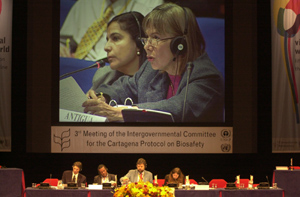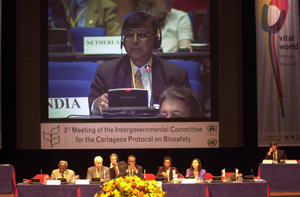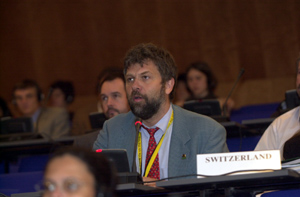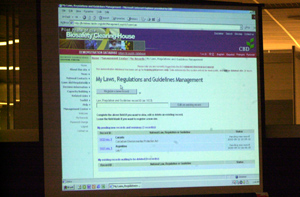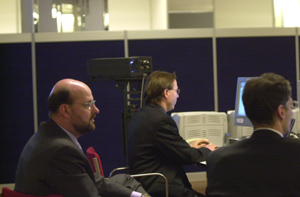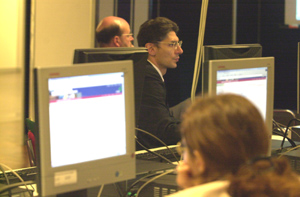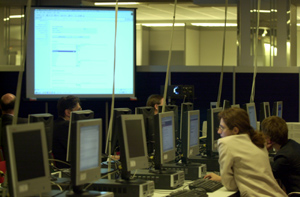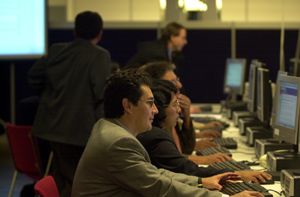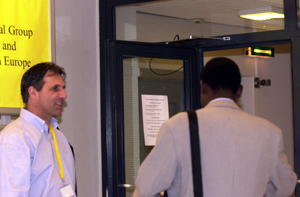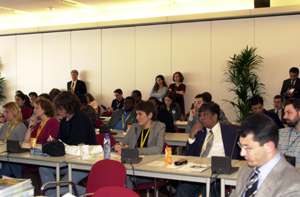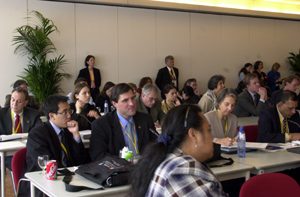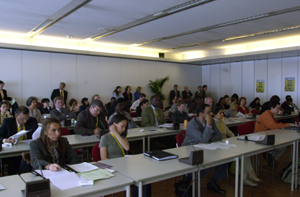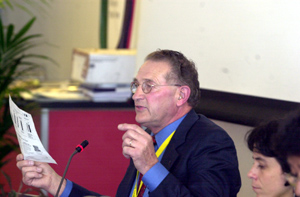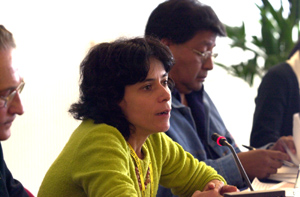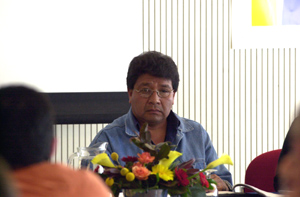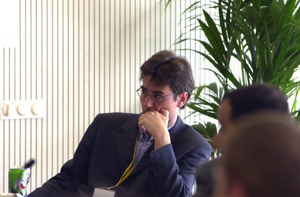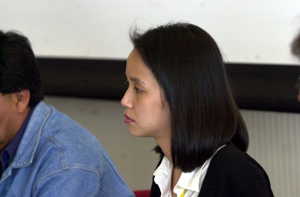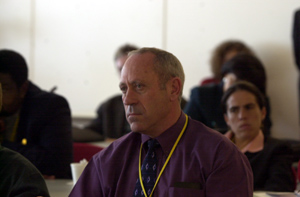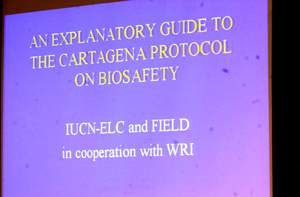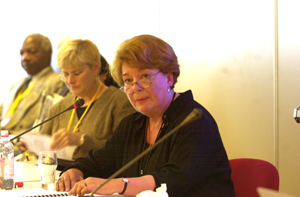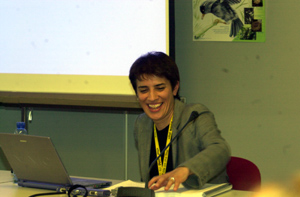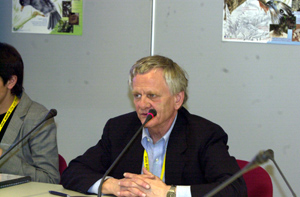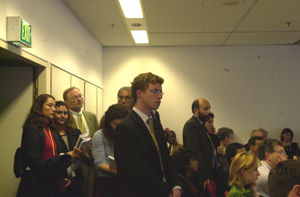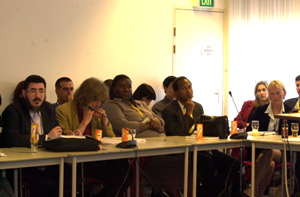|
||||||||||||||||||
Highlights
for Wednesday 24 April 2002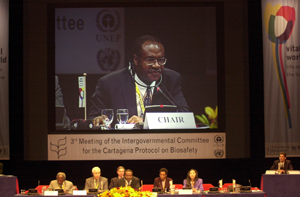 Delegates
to the third meeting of the Intergovernmental Committee for the Cartagena
Protocol on Biosafety (ICCP) met in two Working Groups during the day.
Working Group I (WG-I) discussed a Conference Room Paper (CRP) on
monitoring and reporting, as well as how to progress on other issues
necessary for the Protocol's implementation. Working Group II (WG-II)
discussed capacity building, including the roster of experts, and a
Chair's text on liability and redress. A late afternoon Plenary reviewed
progress in the Working Groups. Contact groups on Article 18.2 regarding
documentation requirements and on compliance met throughout the day and
evening. Above photo: The dias during the afternoon plenary chaired by
Philemon Yang (Cameroon). Delegates
to the third meeting of the Intergovernmental Committee for the Cartagena
Protocol on Biosafety (ICCP) met in two Working Groups during the day.
Working Group I (WG-I) discussed a Conference Room Paper (CRP) on
monitoring and reporting, as well as how to progress on other issues
necessary for the Protocol's implementation. Working Group II (WG-II)
discussed capacity building, including the roster of experts, and a
Chair's text on liability and redress. A late afternoon Plenary reviewed
progress in the Working Groups. Contact groups on Article 18.2 regarding
documentation requirements and on compliance met throughout the day and
evening. Above photo: The dias during the afternoon plenary chaired by
Philemon Yang (Cameroon). |
||||||||||||||||||
|
|
||||||||||||||||||
|
|
||||||||||||||||||
|
WORKING GROUP I: MONITORING AND REPORTING |
||||||||||||||||||
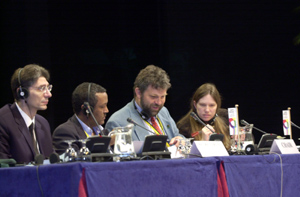 WG-I Chair François Pythoud (Switzerland) introduced UNEP/CBD/ICCP/3/WG.I/CRP.1. With some calls for clarifying the timeframe for comments on the reporting format, delegates changed the deadline from six to five months before the first Meeting of the Parties (MOP). The CRP was then adopted. |
||||||||||||||||||
| OTHER IMPLEMENTATION ISSUES: | ||||||||||||||||||
|
|
||||||||||||||||||
|
|
||||||||||||||||||
| WORKING GROUP II: cAPACITY BUILDING | ||||||||||||||||||
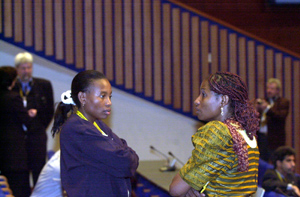 Namibia, on behalf of the AFRICAN GROUP, stressed demand-driven national, regional and subregional programmes, and further identification of roles of and synergies between capacity-building entities and with the CBD Secretariat. Left photo: Martha Kandawa Shultz (Namibia) (far left) in discussion with Mary Fosi Mbantenkhu (Cameroon). |
||||||||||||||||||
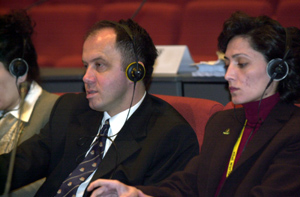 TURKEY further highlighted capacity building for risk assessment for LMOs' identification and evaluation. |
||||||||||||||||||
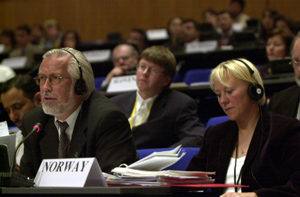 NORWAY questioned the need for the proposed new focal point for biosafety capacity building. Right photo: Norway's Peter Schei with Birthe Ivars making an intervention . |
||||||||||||||||||
| ROSTER OF EXPERTS | ||||||||||||||||||
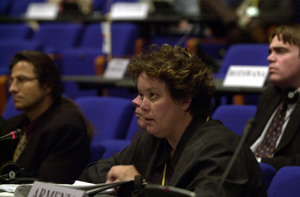 AUSTRALIA supported using a specific budget line within the existing BE Trust Fund as opposed to creating a new trust fund. |
||||||||||||||||||
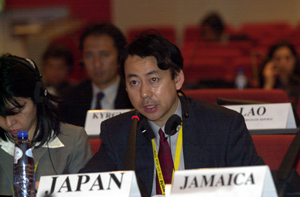 JAPAN highlighted transparency in accounting, availability of financial and evaluation reports through the BCH, and consistency with UN rules on trust funds. |
||||||||||||||||||
| LIABILITY AND REDRESS: | ||||||||||||||||||
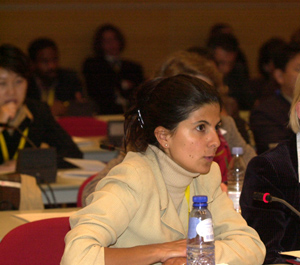 COLOMBIA regretted lack of a decision on the expert group's TORs, and, with MEXICO, called for specific language on organization of workshops. |
||||||||||||||||||
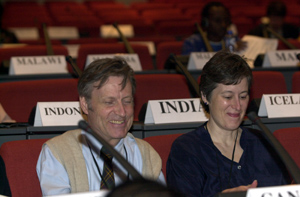 CANADA supported deleting reference to analyzing information, saying it exceeded the process-oriented mandate. |
||||||||||||||||||
| PLENARY: | ||||||||||||||||||
|
|
||||||||||||||||||
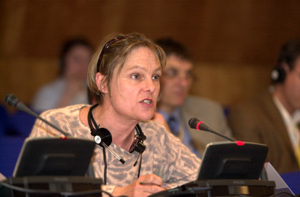 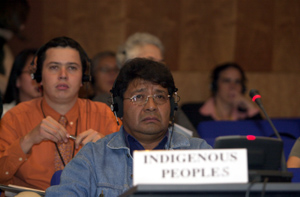
|
||||||||||||||||||
|
|
||||||||||||||||||
| CONTACT GROUPS: ARTICLE 18.2 | ||||||||||||||||||
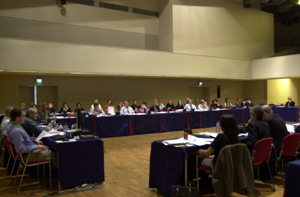 The contact group on Article 18.2 on documentation for LMOs met throughout the day and evening. On Article 18.2(b) regarding documentation for LMOs destined for contained use, delegates debated specific identification requirements. Stressing the need to bring the Protocol forward, some advocated information to include the LMO's name, with documentation stating "LMOs for contained use." |
||||||||||||||||||
| COMPLIANCE: | ||||||||||||||||||
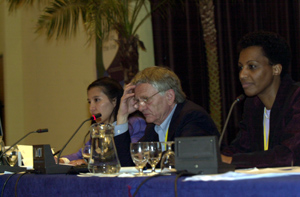 Delegates considered a non-paper. On information and consultation, delegates agreed that the compliance committee would consider information from the BCH, the COP, the MOP, subsidiary bodies of the Convention and relevant international organizations. References to information from NGOs and the Secretariat remain bracketed. Chair Veit Koester (Denmark) (center right) established a drafting group to address suspension of rights and, under procedures, Party-to-Party trigger. |
||||||||||||||||||
| ENB Snapshots: | ||||||||||||||||||
| BCH DEMONSTRATION BY THE CBD: | ||||||||||||||||||
| SIDE EVENT: GENETIC CONTAMINATION | ||||||||||||||||||
| A lunch-time side event, presented by the Edmonds Institute, Friends of the Earth, Greenpeace, HIVOS, Third World Network and Washington Biotechnology Action Council, focused on issues of liability and redress. Percy Schmeiser, Canadian farmer, Claudia Schmitt from the Centro Ecologico, Brazil and Don Miguel Ramirez, Mexican farmer, highlighted cases of genetic contamination. Dan Leskien, Adviser of the European Parliament's Greens, and Jimena Nieto, Colombia, outlined the legal implications of a liability regime. | ||||||||||||||||||
| SIDE EVENT: EXPLANATORY GUIDE TO THE CARTAGENA PROTOCOL ON BIOSAFETY | ||||||||||||||||||
|
A draft of the Explanatory Guide to the Cartagena Protocol on Biosafety, prepared by IUCN and FIELD, in cooperation with WRI, was presented and distributed for comment. The Guide is conceived as a reference tool providing an information base on the content of the Protocol, chiefly by means of a commentary article by article. |
||||||||||||||||||
|
|
||||||||||||||||||
|
Links: The
CBD home page COP-6
Provisional Agenda |PDF|WORD| |
|
|
|| Back to Linkages home || Visit
IISDnet || Send
e-mail to ENB ||
©
2002, IISD. All rights reserved.

